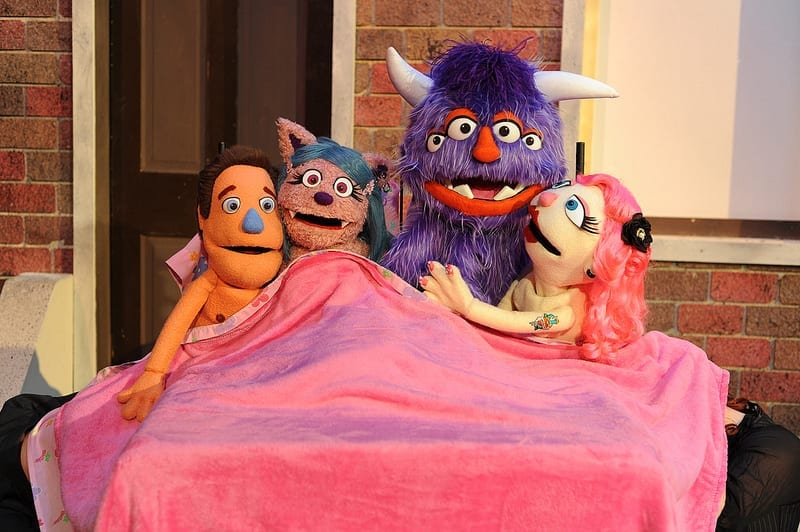SALT LAKE CITY — It is always an interesting experience entering the Babcock Theater at the University of Utah. This space has a long history of hosting some of the most intriguing, varied and unique theater experiences. I have had some of my most memorable theatrical experience in that venue, both amazingly wonderful and horrendously unforgettable. Therefore, I expected that same level of innovation in Avenue Q, one of the most intriguing musicals of the past decade. However, for such a boundary-pushing musical, this production plays it too safe.

Avenue Q is an adult, “real world” skewering of Sesame Street. The puppets and people that inhabit this world face real problems like racism, relationships, sex, and finding their way in the world. The language is frank, blue, and filled with biting humor. The characters play off of well-known characters from Sesame Street, but with enough twists and turns to really throw the whole parody on its ear. And the authors (Robert Lopez and Jeff Marx) really stuck to the formula, even including interstitials involving counting and word construction that both comment on and mock the original. And let’s not forget the warning that accompanies each production: “Avenue Q contains strong language, adult content and puppet nudity. Viewer discretion is advised.”

The show has the puppeteers visible and acting the part with the puppets. It is a unique approach, and one that can either work to propel the energy of the show, or bring it to a halt. Luckily the actors here had the great fortune of working with Jennifer Barnhart, who performed in the Broadway production for its full run. With Barnhart’s guidance, the actors and puppeteers execute the material with gusto. Tia Galanis as Kate Monster was, by far, the standout of the evening. Galanis imbued the character with such emotion that I found myself not watching her, but watching the puppet. Her version of “There’s a Fine, Fine Line” was almost tear-inducing—no small feat in such a broad comedy. Jacob Eltzroth, who performs Trekkie Monster superbly. Trekkie is an obvious spoof on Cookie Monster, and Eltzroth clearly defined Trekkie as a strong character. He did an amazing job of bonding with the puppet and making the puppet the focus of his performance. This was especially well done in his first number “The Internet is for….” Some of the best laughs of the night, however, came from one of the human actors, Martine Green-Rogers as Gary Coleman. In her acting she gave a the sly nod to the audience by breaking the fourth wall without shattering it.

The interstitials are one of the components that make Avenue Q one of my favorite shows. It’s a bit of a guilty pleasure. Avenue Q is a show I relish seeing, but won’t let my kids see or listen to. So it is with some regret that I say this production fell a bit short in some areas for me. Director David Schmidt made use of projections for two of the bits, but these were mere projections of words on a screen. Schmidt could have made the projections so much more substantive by animating them as they would have been done on a kids’ show. Another shortcoming was apparent in the Bad Idea Bears, which have always been a highlight of the show in past productions. They are two highly inappropriate but adoringly cute bears that offer the worst possible advice at the right time. In this version, as performed by Keely Anne McCormick and Gregory M. Neff, they came off as whiny and ordinary. They just seemed to lack the edge that was needed.
Yet despite these criticisms, Avenue Q is still a success for the University of Utah’s actor training program. Avenue Q seems to be one of those shows that will please a crowd and sell tickets under almost any circumstances, sort of like Joseph. There are still a few opportunities that were missed that take away from the potential that Avenue Q can be.
[box type=”shadow”] Avenue Q plays at the Babcock Theatre (on the lower level of Simmons Pioneer Memorial Theatre, 300 S. 1400 E., Salt Lake City) on the campus of the University of Utah, Thursdays through Sundays at 7:30 PM until November 24, with 2 PM matinees on Nov. 16, 17, 23 and 24. Tickets are $10.50 -$18. For more information, visit www.theatre.utah.edu. [/box]

